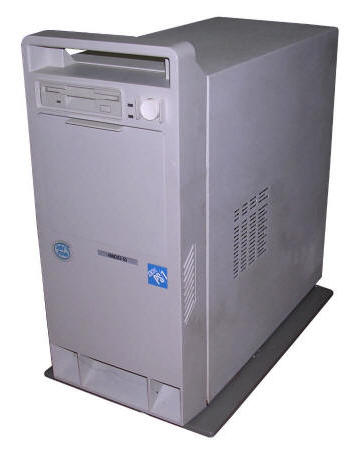IBM PS/1 Model 2168
One of the last IBM PS/1 machines was equipped with
486DX or DX2 processor and RAM expandable by 72-pin SIMM sticks. But the
biggest difference was the casing. While earlier PS/1s were desktop PCs,
Model 2168 was a tower. It had more 3.5" and 5.25" bays (one hard disk
bay was hidden over power supply unit), as well as ISA expansion slots
present on a special daughterboard. In front, a sliding cover is a
characterisitcal part of this machine. The front panel has a power
button and volume control, carrying handle was smartly composed into the
front side too.
This PC was not much popular as there were other, cheaper PC clones with
486 processors. Some versions of them have been sold as IBM PS/1000 (see
this
discussion).
There was a variety of 2168 submodels, so in some units the volume
trimmer in front controlled the volume of MWave sound chip, while in
older units it controls PC Speaker.
| Manufacturer | IBM | |
| Origin | USA | |
| Year of unit | 1993 | |
| Year of introduction | 1993 | |
| Class | AT | |
| CPU | Intel 80486DX2 | |
| Speed | 50MHz | |
| RAM | 32MB (up to 4 72-pin SIMMs) | |
| ROM | PC BIOS | |
| Graphics | Cirrus Logic 1MB (on board) | |
| Sound | SoundBlaster 1 - compatible | |
| System expansion bus | ISA | |
| Floppy/removable media drives | 1x 1.44MB 3.5" FDD. CD-ROM with proprietary card (non original, GCD-R420B) |
|
| Hard disk: | 250MB | |
|
Peripherals in collection: |
||
| Other cards:
|
3Com network card, SoundBlaster card. | |
| Non-standard expansions: | None | |
| Operating system(s): | MS-DOS, Windows 3.x |
My unit came in state of disrepair but it is restored. I
wanted to install OS/2 Warp on it, but there were some graphics problems
when installing newer FixPak's so I decided to stay with Windows.
First, it had damaged power supply unit. Coils were damaged, so I
decided to replace a whole PSU. Fortunately, it is possible to retrofit
a cheap ATX power supply unit.
There is a confusion about PS/1 Model 2168 and Aptiva Model 2168. These two are totally different computers. PS/1 Model 2168 has been released in 1993, while Aptiva 2168 in 1995, and had more multimedia capabilities, different casing and a Pentium processor.
| Contents: | Starting, usage | Links |
Starting
Model 2168 performs IBM's POST and then, if any non-critical error is found, jumps to on-ROM Setup program. This program desn't allow to modify e.g. date,but essential system settings can be set there. If it has nowhere to boot from it, in some models may jump to BASIC but many of these units haven't it. In other cases it will boot floppy or hard disk. BIOS messages are usually not in English, but as code numbers. Code numbers can be checked here.
Disassembly
To avoid unit damage, disassemble the computer following
way:
0. Remove plastic stand by unlocking 2 levers on its bottom (if it is
present at all). You can skip this step if your computer is not in a bad
mechanical condition. If case is skewed or has deformations, remove the
stand.
1. Remove two bolts from the top of machine, under the front handle.
2. Slide the computer off the casing, by pulling front part towards you
while leaving computer in the back. Front side and metal cover will
slide. To help, you can try to put computer on its rear or gently push
the floppy disk drive.
Power Supply Unit
Power supply unit for this IBM is quite non-standard.
The pinout is exactly like AT, but the unit has additional 3-pin connector. This
connector is used as a power switch, making the power supply unit run
when pins are shorted.
Most cheap ATX power supply units can be used by attaching AT cables to
them and connecting the 3-wire connector to the Power on signal
according way:
Mainboard edge
--------------------------------------
| [123]
[AT connector]
| BATT
Where:
1 - +5V Stand-by
2 - Power on signal
3 - GND
This computer doesn't use large power, and so-called 300W ATX units will usually work... if you don't add more CD-ROM or hard drives.
The only problem may be when turning the computer off, because unshorting the pins will not make ATX turn off. Here, a power switch on the rear of a PSU can be used as well as some logic circuit may be built to adapt PS/1 signal with ATX unit.
-
http://ps-2.kev009.com/pcpartnerinfo/ctstips/c776.htm - System
information
-
http://ps-2.kev009.com/pccbbs/ps1/models.txt - All PS/1 models and
their introduction years.





